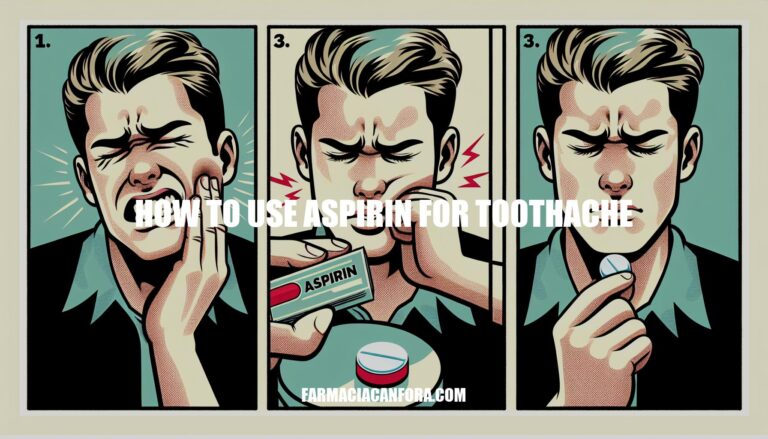


toothache“=”” farmaciacanfora.com=”” href=”https://farmaciacanfora.com/which-ibuprofen-is-best-for-<a href=” https:=””>toothache” https:=”” is-aspirin-good-for-a-
How to Use Aspirin for Toothache:
Note: Avoid placing aspirin directly on the gums for prolonged periods, as it can cause irritation or burns. Always consult a dentist if the pain persists or worsens.
Aspirin helps relieve toothache by reducing inflammation and blocking pain signals. It contains acetylsalicylic acid (ASA), which inhibits the production of prostaglandins—chemicals that cause inflammation and pain. By reducing prostaglandins, aspirin decreases inflammation and numbs the nerves in the affected area, providing pain relief.
For toothache relief, the recommended dosage of aspirin is 325 mg to 650 mg taken orally every 4 to 6 hours as needed. Do not exceed 4 grams (4000 mg) in 24 hours.
Always consult with a healthcare professional before starting any new medication regimen.
When using aspirin for a toothache, follow these precautions:
Potential side effects include stomach upset, nausea, vomiting, heartburn, and in rare cases, serious bleeding. If you experience any severe side effects, such as black stools, persistent stomach pain, or signs of an allergic reaction, seek medical attention immediately.
If your toothache persists, consult a dentist for proper treatment.
Here are some alternative methods for using aspirin to relieve toothache:
Remember to consult a dentist if the pain persists.
Take 325-650 mg orally every 4-6 hours as needed, not exceeding 4000 mg in 24 hours.
Alternatively, crush an aspirin tablet and mix with water to form a paste, applying it directly to the affected area for a few minutes before rinsing thoroughly.
However, avoid placing aspirin directly on gums or teeth for prolonged periods, as it can cause irritation or burns.
If pain persists, consult a dentist for proper treatment.